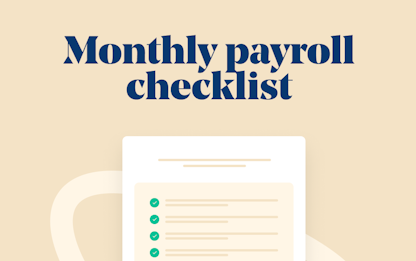- Blog
- |Managing Payroll
- >Payroll legislation
- >Mini budget announcements for businesses
Mini Budget 2022: Key Announcements for Businesses


Major update
The Mini Budget has now been overhauled and replaced with a Medium Term Fiscal Plan. Most of the changes outlined in this article no longer apply.
Last Friday, Chancellor Kwasi Kwarteng made several key announcements about the new government’s fiscal policies. While labelled as ‘Mini-Budget’ or Mini Budget 2022, the event sure packed a punch in terms of the number of announced changes (including several key decision reversals).
The announcements signalled a shift in direction for the UK. While a highly divisive budget, the intent seemed to be to provide measures that would better benefit businesses across the board.
But will these changes amount to a more business-friendly environment? Only time will tell. For now, here are the key changes from the event that are most relevant for your business.
Proposed corporate tax rate increase cancelled
In 2021, the previous government announced a corporate tax rise from 19% to 25% to take effect from April 2023. Well, this is now scrapped.
Instead, corporations will continue to pay tax at 19%. Lower taxes mean larger profits for businesses and, ultimately, more cash in play that can be pumped back into growing and investing.
To break things down, this is what businesses could have expected to pay under the old plan:
Companies making up to 50k in profit would have remained largely unaffected, continuing to pay tax at the 19% rate.
But businesses making over 250k would have had to pay the increased rate (25%).
The picture gets even more complicated for companies making between 50K to 250K. Not only would they have had to pay the increased rate of 25%, but would have had to claim ‘marginal rate relief’ in order to decrease their taxes.
To sum up, the change has made corporation taxes more straightforward and beneficial for businesses of all sizes.
National Insurance hike reversed
Of course, this is the most significant change relevant to the payroll space. The rate hike, which was originally introduced in April 2022, will be completely reversed.
This will take place from the 6th of November 2022 and affect every organisation’s payroll, right down to what employees see on their payslips.
Both the employer’s and employee’s NI rate was originally raised from 13.8% to 15.05% and 12% to 13.25%, respectively. It was originally brought about to help fund the Health and Social Care Levy which was set up to support the NHS post-pandemic. Instead, funding will be provided through government borrowing.
New income tax rates from April 2023
While businesses stand to benefit the most from these changes, there were also tax cuts for employees. From 2023, employees will pay a basic tax rate of 19% instead of 20%. However, the change only applies to employees in the UK, given that Scotland and Wales have different tax bands.
Update: 45% tax bracket removal now reversed
In addition to this, the government also planned to completely remove the 45% bracket - however this decision has since been reversed. This would have meant less taxes for those earning above £150 000 would and that highest tax bracket would have been 40% for annual incomes above £50, 270.
These changes would have been some of the biggest since the devolution in Scotland.
No more dividend rate increase for company directors
Yet another proposed scrap was that of the dividend rate increase for company directors. This was based, again, on an increase the previous government had made to the dividend rates for self-employed directors. Those paying the basic income tax rate saw a jump from 1.25% to 8.75%, while those in the higher bracket saw their dividend rate rise to 33.75%.
As a result, company directors paying themselves through dividends will be able to hang on to more money.
No news on R&D tax relief
The cancellation of the corporation tax increase will have a beneficial knock-on effect on R&D tax relief. Scrapping the rate means claims made under the RDEC Scheme will be more valuable. To illustrate:
Under the old plan - claims from April 2023 would have been world 9.75p to £1 spent on R&D
Under the new one - RDEC claims will be worth 10.53p for every pound spend
Additional announcements relevant to business
Rise in SEIS
Among the chancellor’s announcements, there was also a gross asset limit extension from £200,000 to £350,000. It means that from April 2023, companies will be able to raise up to £250,000 under the SEIS scheme, which is up from £150,000.
Trading age limits have also been reviewed, increasing from 2 to 3 years. Investor limits are also set to double to £200,000.
Higher CSOP Values
Finally, there was a notable increase in Company Share Option Plans (CSPOs) up to £60,000 (double the current value of £30,000).
The number of last-minute legislation changes introduced over the last three years has shown the importance of having payroll software that can keep up. Fortunately, PayFit is a cloud-based software that’s continuously updated, which means you can rely on our platform always being updated with the most up-to-date legislation within days of it being announced.
Rebecca Russell
ACIPP
Stay payroll compliant with PayFit
PayFit is the smart, simple, and smooth way to manage your payroll.
Our very own programming language allows us to keep up with the latest legislation changes.
Not only is PayFit HMRC-recognised, but it's also backed by real CIPP payroll experts.
Pay your people accurately, on time and with zero fuss through our user-friendly platform. Automate RTI submissions, make changes and integrate with your favourite HR software for a smoother, more intuitive experience that flexes with your business needs.


Types Of Flexible Working - A Guide For Employers

What is Flexible Working Within the UK Workplace?

Understanding the Paternity Leave Changes in 2024

International Day of Transgender Visibility Guide

A Guide to 360 Degree Feedback for UK HR Teams

